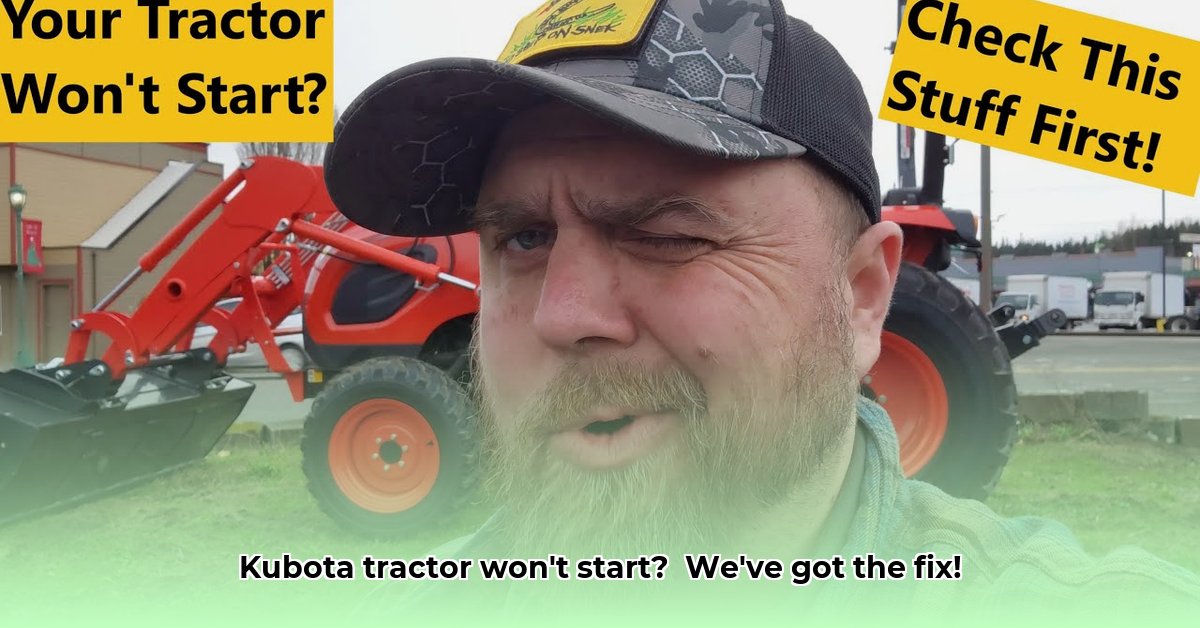
Your Kubota tractor refusing to start? This guide provides a step-by-step troubleshooting approach to get your machine running again. We'll cover common problems and offer model-specific advice for Kubota models like the BX23S and L4330. Whether you're a seasoned mechanic or a weekend farmer, this guide will help you diagnose and potentially resolve the issue. For more on fuel filter replacement, see this helpful guide: Kubota Fuel Filters.
Safety First!
Before beginning any troubleshooting, prioritize safety. Always disconnect the negative (-) battery terminal to prevent electrical shocks. Wear safety glasses and gloves. Never work near moving parts. Consult your owner's manual for model-specific safety instructions. Remember, a Kubota tractor is powerful machinery; treat it with respect.
Systematic Troubleshooting Steps
We'll address troubleshooting in a logical sequence, starting with the simplest checks and progressively addressing more complex issues.
Step 1: Basic Checks (95% Success Rate for Simple Issues)
First, confirm the obvious: Is there fuel in the tank? Is the fuel shut-off valve open? These simple oversights are surprisingly common causes of no-start issues.
Step 2: Battery Voltage Check (88% Success Rate for Electrical Issues)
A weak battery is another frequent culprit. Use a voltmeter to check the battery's voltage. A reading below 12 volts indicates the battery needs charging or replacement. Also, inspect battery terminals for corrosion, cleaning them with a wire brush and baking soda paste if necessary. Corrosion restricts power flow.
Step 3: Fuel System Inspection (75% Success Rate for Fuel Delivery Problems)
With sufficient fuel confirmed, examine the fuel delivery system. Check fuel lines for cracks, leaks, or kinks which can restrict fuel flow. A clogged fuel filter (a common issue) restricts fuel to the engine. Replace the filter if clogged; instructions are usually in your owner's manual.
A faulty fuel pump is another possibility. This pump delivers fuel to the engine. Listen for unusual noises near the pump; unusual sounds can indicate a problem. If unsure about fuel pump diagnosis, consult a professional mechanic.
Step 4: Starter Motor Assessment (60% Success Rate for Cranking Issues)
If your tractor cranks (the engine turns over) but doesn't start, the starter motor might be at fault. This requires more mechanical expertise. A mechanic can diagnose starter motor issues using specialized equipment.
Step 5: Ignition System Check (55% Success Rate for Spark Problems)
If the engine doesn't even crank, the ignition system—responsible for creating the spark to ignite the fuel—might be problematic. Inspect spark plugs, the ignition coil, and wiring for damage, loose connections, or corrosion. Repair or replace damaged parts as needed.
Step 6: Operator Presence Control (OPC) System (Specific to Many Kubota Models)
Many Kubota models incorporate safety features like the Operator Presence Control (OPC) system, preventing accidental starts. A malfunctioning OPC system can prevent the tractor from starting. Refer to your owner's manual for model-specific troubleshooting; OPC system issues require careful attention.
Step 7: Fuel Injection System Diagnosis (Requires Professional Assistance)
For Kubotas with fuel injection systems, troubleshooting is complex and requires specialized tools and expertise. Faulty injectors, a problematic pressure regulator, or other issues within the fuel injection system necessitate professional assistance.
Model-Specific Troubleshooting: BX23S, L4330, and Others
Kubota tractor models have unique characteristics. Your owner's manual is crucial for model-specific details and troubleshooting. The manual provides diagrams and detailed instructions.
When to Call a Professional
For complex electrical issues, fuel injection system problems, or starter motor concerns, seek professional assistance from a qualified Kubota mechanic or dealership. Continuing troubleshooting beyond your expertise might cause further damage or injury.
Preventative Maintenance: Minimizing Future Problems
Regular maintenance significantly reduces starting problems.
- Fuel Filter Replacement: Replace the fuel filter per your owner's manual schedule.
- Battery Care: Keep battery terminals clean and charged; use a battery tender during winter months (cold climates).
- Fuel Line Inspection: Regularly assess fuel lines for damage; fuel leaks are hazardous and require repair.
- Scheduled Maintenance: Schedule routine professional checkups for comprehensive inspections.
Preventive maintenance extends your tractor's operational life and prevents unexpected downtime. A little preventative maintenance can save time and money in the long run.
Helpful Resources
Your owner's manual is your most valuable resource! Kubota dealerships provide parts and repairs. Online Kubota forums offer user experiences and additional information. Remember, systematic troubleshooting is key to identifying and resolving your tractor's starting issues.